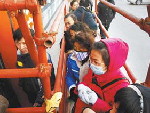

It is more expensive to buy an apartment in Beijing than in 35 other cities in China, and several family members often contribute to the cost of property in the capital, new data shows.
The latest Chinese Academy of Social Sciences housing development report found Beijing's housing affordability rated at 0.34, the lowest score among the 35 cities, while the average score was 0.8.
The report showed families in the capital pay far more than 25 percent of their household income per month to service housing loans.
"Usually, the housing loan is recommended at being lower than 25 percent of the monthly household income," Zhang Qingyong, researcher and lead author of the research.
Li Kaifa, a researcher at the Chinese Academy of Management Sciences, said the housing price in Beijing was often too high for a couple to afford.
"So it means that in Beijing, one apartment is not just bought by one generation of a family, but by two or three generations."
Li said it was estimated that 50 percent of Beijing's housing was bought by outsiders from other cities. He said business people in other cities like to buy housing in Beijing as an investment.
Wang Ling, a 29-year-old engineer from Dongcheng district, said he and his wife bought a 60 sq m apartment in March and pay almost 5,000 yuan per month in loan repayments.
"I earn 3,800 yuan and my wife earns 3,500 yuan per month. Though we have to cut a lot of spending on shopping and travel, I still feel lucky to buy it because the housing price has rocketed so much," said Wang.
The average housing price has reached 19,750 yuan per sq m inside the Fourth Ring Road, according to data from the Beijing municipal statistics bureau.
The report also said that at least 20 percent of properties in Beijing were bought as investment opportunities and this caused bubbles.
A housing bubble index is calculated by dividing the base price with the actual price. The average housing price in Beijing was 12,205 yuan per sq m from January to August while the base price was 9,640 yuan per sq m.
The housing bubbles in Beijing are much worse than Shanghai, Guangzhou and Shenzhen, the data showed.